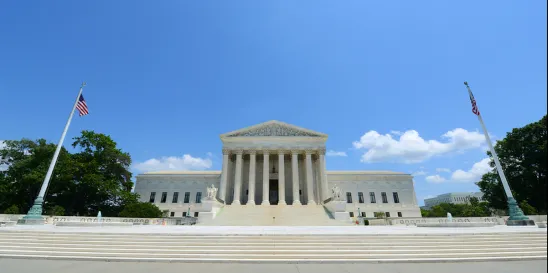On October 4, 2023, the Supreme Court will hear oral argument on Acheson Hotels, LLC’s petition for certiorari (Laufer v. Acheson Hotels, LLC, granted March 27, 2023), to answer the question: “Does a self-appointed Americans with Disabilities Act ‘tester’ have Article III standing to challenge a place of public accommodation’s failure to provide disability accessibility information on its website, even if she lacks any intention of visiting that place of public accommodation?”1
In the underlying case2, the United States District Court for the District of Maine dismissed the suit for lack of Article III standing. On appeal, the First Circuit reversed, concluding that the denial of accessibility information is an actionable Article III injury – and that “Laufer had no intent to use the information for anything but a lawsuit doesn’t change things.”3
Topics potentially addressed in the upcoming oral argument include (1) the diverging circuit court positions pertaining to “tester plaintiff standing” that have arisen from Laufer’s identical ADA complaints; (2) preserving disabled individuals’ avenues to enforce the ADA online without lasting harm to defendant businesses; and (3) reigning in ADA plaintiffs’ abusive litigation tactics. As described below, developments in related proceedings from June 30, 2023, to the present, also may be addressed.
The Circuit Court Split on Tester Plaintiff Standing Arising from Laufer’s ADA Complaints
Laufer filed more than 600 identical ADA complaints in district courts across the United States, alleging that her observation of the fact that online reservation sites of defendant hotels were noncompliant with the ADA’s Reservation Rule (28 C.F.R. § 36.302(e)(1)(ii)) resulted in actionable injury to her.4
Laufer did not reserve a room or stay at any of the defendant hotels, nor did she have any intention to do so. Rather, she visited defendants’ websites because as a “self-proclaimed ‘advocate’ for ‘similarly situated disabled persons,’ […] Laufer tests online reservation systems (ORS) of hotels and lodging establishments to ensure that these systems comply with ADA regulations […].”5 The circuit courts are split on whether a tester plaintiff’s observation of an ADA accessibility violation on a business’s website, without intent to use or access the services or products offered, constitutes sufficient injury to confer standing to sue the website’s operator.
In favor of tester plaintiffs, the First Circuit holds that if a tester can show informational injury – that they were entitled to information (e.g., under the ADA’s Reservation Rule) and observed that they were denied access to it (even by inadvertent omission on defendant’s website), regardless of their need to use that information or purpose in seeking it – they have established standing.6 The Fourth Circuit holds that a tester plaintiff need only allege concrete plans to return to the defendant’s website, if only to continually monitor the website for ADA compliance, in order to sufficiently plead injury establishing standing.7
At the time Acheson petitioned for certiorari, the Eleventh Circuit favored tester plaintiffs as well, and only required a showing of emotional injury to establish standing, i.e., frustration, humiliation, isolation and segregation, resulting from the stigma of observing discrimination.8 However, Laufer’s strategic voluntary dismissal of the Eleventh Circuit appeal, and the dissolution of defendant Arpan, LLC, rendered the Eleventh Circuit’s decision moot and vacated.9
Adverse to tester plaintiffs, the Second Circuit’s position is opposite that of the First Circuit, rejecting a tester plaintiff’s allegation of informational injury to establish standing, where the plaintiff had not shown he had an “interest in using the information … beyond bringing [his] lawsuit.”10 The Fifth and Tenth circuits are in agreement with the Second Circuit.11
The Nature of the Internet May Alter Dependence on “Tester Plaintiffs” in ADA Enforcement
The briefs of Laufer and amici curiae caution against a holding that would wipe out the observational online advocate as tester plaintiff in digital access ADA litigation because, historically, tester plaintiffs have served a key function in the ADA enforcement ecosystem.12
The conventional tester plaintiff was an advocate who enforced the ADA on behalf of similarly disabled individuals who were unable to shoulder the burden of travelling the physical world to personally interact with the source of the discrimination for the purpose of compiling incidents or identifying the systemic discrimination needed to establish standing.13
In contrast, with online accessibility discrimination, the injury alleged to establish standing accrues in an intangible environment that is readily available to most disabled individuals, without the time, travel, planning, investment and personal risk inherent in acting as a tester plaintiff in the physical world. This raises the question of whether tester plaintiffs are necessary to ADA enforcement in the context of online violations where the burden of collecting incidents of discrimination is so low that nearly anyone could do it.
Disciplinary Proceedings against Laufer’s Attorney Demonstrate the Harms Perpetuated by Abusive ADA Litigation
Acheson and amici take the position that if the U.S. Supreme Court agrees with the First Circuit, requiring that Laufer make a very minimal showing of informational injury in order to gain Article III standing as a tester plaintiff, such a decision would green-light disabled individuals to claim tester plaintiff standing en mass, and embark on a crusade of vexatious ADA litigation, forcing businesses of all sizes to bear the cost of litigation even after having remediated the digital access violation observed on their website by a tester plaintiff.14
Acheson’s position that abusive ADA litigation causes disproportionate harm to hundreds of small businesses is supported by investigation and disciplinary proceedings against Laufer’s former attorney, Tristan Gillespie. Three months after the petition for certiorari here was granted, the United States District Court for the District of Maryland suspended Gillespie for six months for reportedly, among other things, conduct concerning candor to the tribunal and candor during settlement negotiations.15
The investigation revealed Laufer’s attempt to capitalize on the goodwill historically associated with the ADA “tester plaintiff” as a cover for a vexatious litigation scheme to extract money from small businesses related to websites that contained technical accessibility violations of the ADA. Laufer and Gillespie used identical pleadings (typographical errors and all) in each action, claiming $10,000 in attorneys’ fees from each defendant.16
During settlement discussions, Gillespie purportedly misrepresented to defendants that he put $10,000 of work into the lawsuit against that defendant alone and in uncontested motions for default judgments, Gillespie reportedly misrepresented to the courts that he had performed $10,000 worth of work on each matter. Laufer and Gillespie allegedly raked in thousands in unsupported attorneys’ fees via settlement and court awards. But as Gillespie and Laufer filed hundreds of cookie-cutter actions in quick succession, each alleging that Gillespie performed $10,000 of work per claim, courts apparently realized that Gillespie could not have worked $10,000 worth of hours on each case in the time frame the actions were filed and began investigations.
Laufer’s Campaign of Voluntary Dismissals Has Changed the Balance of the Circuit Split, But Has Not Rendered Acheson’s Petition Automatically Moot
Following the initiation of the disciplinary investigation, Gillespie and Laufer’s other counsel voluntarily dismissed hundreds of Laufer’s ADA claims at all stages of litigation, including the underlying action against Acheson. A Notice of Voluntary Dismissal (Dismissal Notice), was filed.17 Laufer’s current counsel filed a Suggestion of Mootness with the Supreme Court, arguing that due to Laufer’s “abandonment of her claim against Acheson, there is no reason for this Court to expend further time or judicial resources on the [tester] standing question presented in the petition.”18
In response, Acheson contends that “Laufer is abandoning her case to pave the way for Laufer and similar [tester] plaintiffs to resume their campaign of extortionate ADA suits against unwitting small businesses without the hindrance of an adverse ruling from this Court.”19 The Supreme Court initially denied Laufer’s Suggestion of Mootness, but added the question of mootness to be considered at oral argument.20
Though unsuccessful in dismissing this petition, Laufer’s campaign of voluntary dismissals has unexpected results. The Fourth Circuit dismissed the appeal, while leaving their tester-friendly decision in place.21 The Eleventh Circuit not only dismissed the appeal but also vacated their March 2022 decision comprising part of the circuit split on which this petition for certiorari is based.22 The decision to vacate notes that Laufer let her tester-friendly decision (which was moot at the time it was issued due to Arpan LLC’s dissolution) stand for 15 months before informing the Court that it was moot, on the same day that she filed the Suggestion of Mootness with the Supreme Court.
Notably, those 15 months encompass the First Circuit’s tester-friendly decision and the entire pendency of Acheson’s petition for certiorari. Without the Eleventh Circuit’s decision, the First Circuit would have been the first to issue a tester-friendly decision. Even if the First Circuit had issued the first tester-friendly decision, nonetheless, the circuit split would have remained 1–3 adverse to tester plaintiffs, until the Fourth Circuit’s decision on February 15, 2023 – barely a month before the petition for certiorari was granted. Because the Eleventh Circuit’s decision was vacated after all amici briefs were submitted, any effects have been addressed only briefly in a single exchange by the parties.23
Conclusion
In the past three months, this case has evolved due to the developments in related proceedings. The issue of mootness has been added to the question presented; the balance of the circuit court split would have been markedly different without the Eleventh Circuit’s vacated decision; and the details of Laufer’s abusive litigation scheme were made public in the disciplinary proceedings against Gillespie, all of which are topics that may be addressed at the October 4, 2023, oral argument before the Supreme Court.
Despite the submission of the Suggestion of Mootness, the Supreme Court is proceeding with oral argument on October 4, 2023. The extent to which the Court decides to opine on tester standing remains to be seen, and it is uncertain as to how far the Court may be willing to apply its decision if one is issued. While the Laufer v. Acheson case was focused on a challenge to a place of public accommodation’s failure to provide disability accessibility information on its website pursuant to the ADA Reservation Rule, it is unknown whether the ruling will impact the ever-increasing number of web accessibility cases filed each week for violations of general web accessibility.
With AAAtraq, WebAim and other web accessibility reference sources reporting that upward of 95 percent of all websites are noncompliant with the ADA, the volume of litigation that could arise if tester plaintiffs were permitted to file suit absent an intent to use or access the services or products offered is staggering. While UsableNet.com reports 448 such suits filed in August 2023, the potential for court-clogging filings is real.



 />i
/>i

